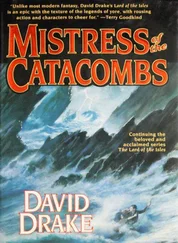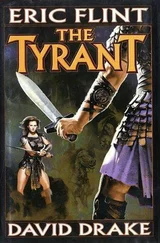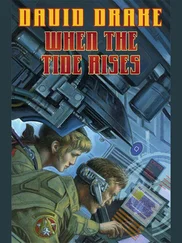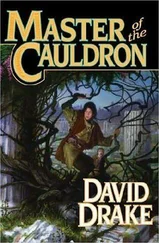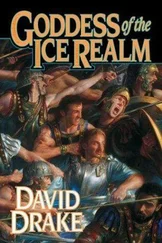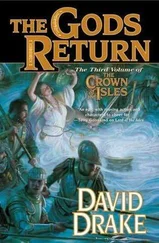David Drake - Out of the waters
Здесь есть возможность читать онлайн «David Drake - Out of the waters» весь текст электронной книги совершенно бесплатно (целиком полную версию без сокращений). В некоторых случаях можно слушать аудио, скачать через торрент в формате fb2 и присутствует краткое содержание. Жанр: Фэнтези, на английском языке. Описание произведения, (предисловие) а так же отзывы посетителей доступны на портале библиотеки ЛибКат.
- Название:Out of the waters
- Автор:
- Жанр:
- Год:неизвестен
- ISBN:нет данных
- Рейтинг книги:3 / 5. Голосов: 1
-
Избранное:Добавить в избранное
- Отзывы:
-
Ваша оценка:
- 60
- 1
- 2
- 3
- 4
- 5
Out of the waters: краткое содержание, описание и аннотация
Предлагаем к чтению аннотацию, описание, краткое содержание или предисловие (зависит от того, что написал сам автор книги «Out of the waters»). Если вы не нашли необходимую информацию о книге — напишите в комментариях, мы постараемся отыскать её.
Out of the waters — читать онлайн бесплатно полную книгу (весь текст) целиком
Ниже представлен текст книги, разбитый по страницам. Система сохранения места последней прочитанной страницы, позволяет с удобством читать онлайн бесплатно книгу «Out of the waters», без необходимости каждый раз заново искать на чём Вы остановились. Поставьте закладку, и сможете в любой момент перейти на страницу, на которой закончили чтение.
Интервал:
Закладка:
"I don't think Tardus will be reporting this intrusion to the authorities," Varus said.
"Probably true," Pandareus said. "In that case, we have only a monster capable of wrecking a city to worry about."
Varus chuckled.
They entered the second chamber, twice the size of the first. Stone benches were built into three walls, intended for diners who were sitting upright instead of reclining as was the custom for men in Carce. Servants would set tables of food and wine in the hollow within the three benches.
In place of a fourth wall, passages to either side flanked an alabaster slab carved in relief. Varus raised the lantern again to view the carving, a man with a full beard seated in a high-backed chair and glaring outward.
"Sarapis joining his worshippers for the sacred meal," Pandareus said. Then, looking upward, "The frieze is interesting."
Varus moved the lantern. The reliefs were of very high quality: a bearded man flanked by a youth and a young woman in flowing robes; in the next panel, the youth thrusting back the woman who, bare-breasted, was trying to pull him onto a couch; in the last- "This is Hippolytus and Phaedra," Varus said aloud. "Hippolytus cursed by his father Theseus, who believed his wife's false claim that her stepson had raped her."
"Yes," said Pandareus. "Those three, and the monster which executed Theseus' curse."
On the third panel, a tentacled, many-legged monster climbed out of the sea in the background. Hippolytus' chariot raced through brush, dragging behind it the youth whose reins remained wrapped around his wrists when he was thrown out.
"Do you suppose this is what we were meant to see?" Varus said.
Pandareus shrugged. "There must be another room," he said.
They walked to right and left of the carving of Serapis. On the other side, Varus found a tunnel stretching farther into the distance than his lantern could even hint. "This seems to slope downward," he said, turning toward Pandareus.
The teacher was not there. Varus was alone in a tunnel. Behind him was a faint rectangular glow, the sort of light that he might have seen creeping past the edges of the slab from the trap door in the distant gazebo.
Varus took a deep breath, then walked forward at the measured pace of a philosopher and a citizen of Carce. He wondered what he would find at the other end of the tunnel, but it was pointless to speculate. If Typhon waited for him, so be it.
The floor of the chapel had been of simple mosaic design, black frames each crossed by an internal X, on a white ground. Now Varus was walking on seamless sandstone: the tunnel had been drilled through living rock.
There was something ahead: at first just a texture on the sidewalls. Then, as Varus proceeded with the lantern, he saw that the walls had been cut back at knee height to make shelves. On them were terracotta urns, similar to ordinary wine jars. Instead of ordinary stoppers, these jars were closed with the stylized heads of birds with long curved beaks.
One of the jars had fallen and shattered some distance down the long corridor. Varus paused and knelt to bring the lantern closer: there would be nothing at the other end of this passage that wouldn't wait for him to arrive. Given that it might be his goal might be death, he wasn't going to have the regret that he'd hastened past his last opportunity for learning.
He smiled, but he meant it. Pandareus would understand; and perhaps Corylus would as well.
The jar had enclosed the corpse of a bird. It had been mummified-the smell of natron and cedar resin was noticeable even after what might have been ages-but the skull was bare beneath rotted linen wrappings.
It had been an ibis. There were thousands or tens of thousands of ibises in this necropolis.
Varus rose to his feet and walked on. He had to restrain himself from counting paces under his breath. He wasn't sure that he was really moving physically anyway. It would be unworthy of a philosopher to carry out a meaningless ritual to trick his mind into the belief that he was imposing control over his immediate surroundings.
I think I see light. But Varus knew that he could see flashes even when his eyes were closed; and he had to admit that his present state of mind wasn't wholly that of a dispassionate philosopher.
He wondered if Socrates had really been that calm when he prepared to drink the poison. Plato had not been a disinterested witness, now that Varus thought about it; given that Plato's stature as a teacher was directly dependent on the stature of the master whom he portrayed as showing godlike wisdom and fortitude.
Varus chuckled. He would have described himself as an Epicurean; but perhaps the teachings of Diogenes the Cynic better suited his present mental state.
"Greetings, Lord Varus," called the man standing at the end of the corridor. The pool of light surrounding him did not come from any source Varus could see. "I am Menre."
Varus stepped to within arm's length of the stranger who wore a woolen tunic, a semicircular cloak that hung to his waist, and a low-crowned, flat-brimmed leather hat. He would have passed for an ordinary traveller anywhere in Greece or the southern portions of Italy.
"Sir, you're Menre the Egyptian?" Varus said in puzzlement. The stranger-Menre-held a bulky papyrus scroll in his left hand.
Menre laughed. "Sarapis is more Greek than Egyptian," he said, "and perhaps the same is true of me. Regardless, the chapel was a useful connection between you and the place I am."
Varus found his lips dry; he licked them. He said, "Sir, I would have expected you to visit my teacher Pandareus, as you have in the past. Rather than me."
Menre looked him up and down as though he were a slave-or a couch-he was considering buying. Smiling faintly, he said, "Pandareus is a great scholar, worthy of a place in any learned academy. But he is not a magician, so this-"
He offered the scroll in his left hand.
"-would be of no use to him or to the world."
Varus took the scroll. He started to fumble with it, then set the lantern on the floor so that he had both hands free. There was as much light as there would be outside at midday in Carce, even if he couldn't tell where it was coming from.
He unrolled a few pages of the book; Menre watched him, continuing to smile. The text was in pictographs; chapters were headed-he unrolled more of the scroll to be sure-by paintings in the Egyptian style, full frontal or full profile; gods of terrible aspect confronted humans.
Still holding the book open, Varus met the other man's eyes. "Sir," he said, "this is written in Egyptian holy symbols. I can't read it."
"Can you not, Magician?" Menre said. To Varus, his words were an eerie echo of those the Sybil sometimes directed at him. "Try."
Scowling, Varus looked down at the page, as meaningless to him as bird tracks in the dust. He said, "All hail to Ra, the Sun, as he rises in the eastern quadrant of heaven!" He stopped, amazed.
"You will need the book," Menre said, smiling more broadly. "Give my regards to your teacher, whose scholarship I respect."
The light began to fade; Menre faded with it, as though he had been only a mirage. Just before he vanished completely, his faint voice added, "You will need more than the book, Lord Varus. Perhaps more than your world holds. Good luck to you, but I am not hopeful."
Varus swallowed. For a moment, his surroundings seemed as dark as the tomb; then his eyes adjusted to the oil flame wavering in the lantern which sat on the ground beside him. He picked it up again. The large scroll had vanished, as though it never was.
He and Pandareus were in the service area of the chapel. Food couldn't be prepared here, but prepared dishes would be brought in ahead of time and then served in sequence to the diners.
Читать дальшеИнтервал:
Закладка:
Похожие книги на «Out of the waters»
Представляем Вашему вниманию похожие книги на «Out of the waters» списком для выбора. Мы отобрали схожую по названию и смыслу литературу в надежде предоставить читателям больше вариантов отыскать новые, интересные, ещё непрочитанные произведения.
Обсуждение, отзывы о книге «Out of the waters» и просто собственные мнения читателей. Оставьте ваши комментарии, напишите, что Вы думаете о произведении, его смысле или главных героях. Укажите что конкретно понравилось, а что нет, и почему Вы так считаете.

